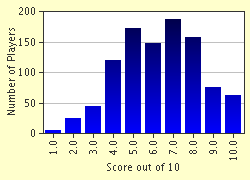Quiz Answer Key and Fun Facts
1. The term 'hara-kiri' is very commonly used, in a joking manner, by English speakers who want to imply that suicide might be their next option. But 'hara-kiri' is a suicide ritual that is taken very seriously by the Japanese, particularly during the Samurai era. What does 'hara-kiri' literally mean?
2. Lots of Japanese martial arts have become popular in the English speaking world. Which of the following names of a Japanese martial art literally translates as 'empty hand'?
3. Which of these Japanese martial art names translates literally as 'the gentle way'?
4. True or false: The term 'yen', meaning 'a strong craving or desire', comes to the English language from the Japanese.
5. Which of these words for a bean came to us through Dutch, via Japanese?
6. 'Rickshaw', the word for a man-powered pedicab ubiquitous throughout Asia during the late 19th and early 20th centuries, and often associated with Western colonialism, comes to us from the Japanese language. But which Western author popularized the term in a short story he wrote in the late 19th century?
7. This three letter word for a kimono sash has become so popular in English crossword puzzles, that it has been added to most English language dictionaries. What is the word?
8. Origami has seemingly become a big hobby in the West, and we have the Japanese to thank for it. Here's a wicked 'yes or no' question...the word 'origami' translates literally as 'folded paper'.
9. A food question, because I'm getting hungry. Sushi is another huge trend that has caught on in the West, brought to us by the very clever Japanese. But if 'sushi' is the general term for the vinegared rice which is supplemented by seaweed and raw fish, what is the general term for the thinly sliced pieces of raw fish eaten by themselves (both usually with a wasabi/soy dipping sauce)?
10. Finally, which of these words translates literally from the Japanese as 'divine wind'?
Source: Author
thejazzkickazz
This quiz was reviewed by our editing team before going online.
Any errors found in FunTrivia content are routinely corrected through our feedback system.

